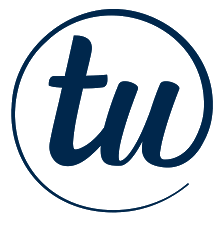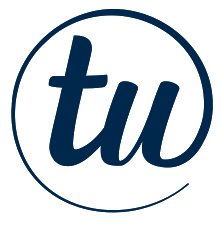“Don’t try to just get a degree.”
“It’s gonna suck some days… but hopefully, by the time you cross that stage, you’ll see it got you to where you wanted to go.”
Jordan Mendoza is a former COMM major and CTVA graduate. While at Cal State Fullerton, he worked at The Daily Titan, where he served as a sports editor, editor-in-chief, and senior editor. Since graduating, he’s worked full-time as a sports reporter for USA Today.
Kemdi:
Hi Jordan, thank you again for agreeing to do this. My first question concerns your chosen field, journalism. Where did your love of sports begin?
Jordan:
It started, honestly, very early in my life. My parents always told me I was super interested in sports even as a young baby. I loved sitting, just watching as a kid, and learning all about them. When I was little, I used to read the newspaper and watch SportsCenter all the time. I wanted to know everything about all sports. As I got older, I just got more versed. By the time college came around, I was fully aware of all the sports and all the things that I wanted to know, and it helped me start my career.
Kemdi:
Did you play sports too?
Jordan:
Yeah, I played basketball, which was my first sport, all the way up until high school. I also played some Little League for a couple of years. I never played like actual football, though; it was more like a thing I played with my friends.
Kemdi:
Did you have other career options that you considered before sticking with journalism?
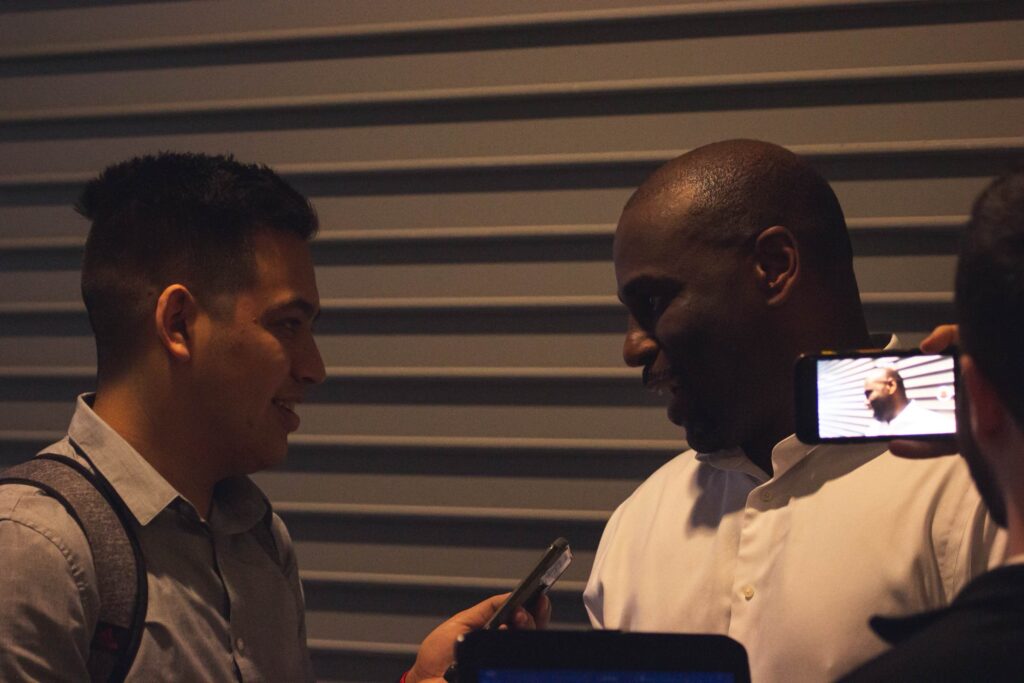
Jordan:
Kinda in a way. I knew I wanted to do something in media, and being in journalism and specifically being a writer, was high up there in terms of choices. I considered being a broadcaster, whether it be at the news desk or a field reporter, and things similar to that. I also considered public relations, working at a communications department, for, like a team, or a league, or a conference, or just like a firm, you know. Ultimately, being a writer was the thing that I ended up sticking with for the rest of my time during college.
Kemdi
You went to Cal State Fullerton for only two years because you took the community college route originally and later transferred. Do you recommend that path for others?
Jordan:
I recommend it, for my path, I knew what I wanted to do. However, people change their majors a lot in college, so it helps when it comes to saving time and money, as well as getting required classes out of the way. I also had the chance to try out the things that I wanted to do for my career and see if I liked doing them. Thankfully, I learned that I did. I enjoy being in the media and things like that. I’ve had the same experience as a lot of my friends and close family in terms of getting through college. They made sure that they found the thing that they wanted to do, and I also know other people as well who went to college thinking that they wanted to do this one thing. And they left community college wanting to do something completely different. And they didn’t have to deal with the whole transition or figuring out how to switch majors and paying all the money that comes on top of it as well, too. So yeah, the community college route was very beneficial for me.
Kemdi:
How would you describe your overall experience at Cal State Fullerton? How did you maintain a work-life balance?
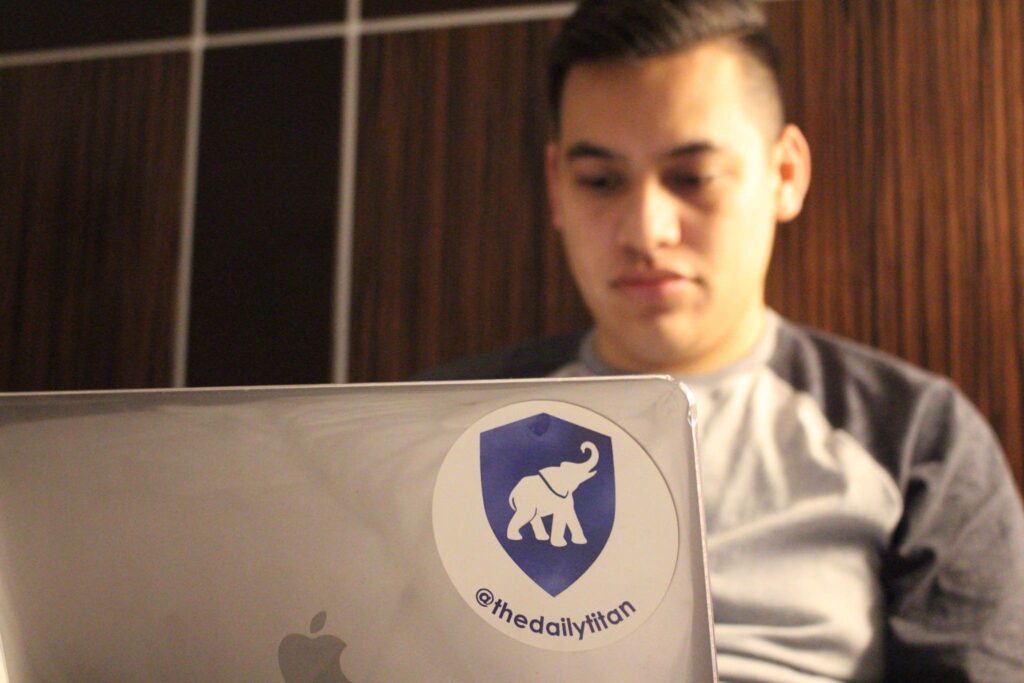
Jordan:
I worked at the Daily Titan when I was at Cal State Fullerton. I was a sports editor my 1st semester, and then I was the editor-in-chief for 2 semesters, and then I finished off as a senior editor. It was a very interesting balance, trying to figure out how to do school and be a reporter. People don’t realize that, when you’re working in the media, the news is always happening. It’s not just a job that you can just clock in and clock out of. Stuff happens at all at random different times. So it’s a hard balance, figuring out my assignments and going to class while making sure that I was doing my stories and going to do my coverage of things like games or events that were conflicting times.
I was getting things I could do to get my degree. I also made sure I was getting the clips that I wanted to get on my reel. So it was hard. Everyone does it differently. Everyone prioritizes stuff differently, and whatever works for other people works for them. But I’d say for me, it was definitely like a lot of learning. By the end of my time at Cal State Fullerton, I felt I had found a good balance of dividing up my classwork and assignments.
I was basically on campus all day, so it got very tiring, and it was tough to kind of figure out. I learned a lot about how to work long hours under stress and things like that
Kemdi:
Would you recommend extracurriculars for journalism students looking to get more experience?
Jordan:
I would say, yes, it was the most rewarding experience I could have possibly imagined for myself. Once I finally got hired for a professional job, I knew what I was doing and I think a lot of people that I worked with can say the same, just because we had so many hard news stories. The classes that we have teach a lot. You’ll know how to structure a story, and things like that. But you don’t know how to work until you are thrown into the deep end. It was a very rewarding experience. For anyone who wants to get into journalism, I always tell them that you have to join something. The best thing you can do for yourself is build up a portfolio and show what you’re doing and that you have a basic understanding of. I don’t think I would have been able to do this had I not been part of the Daily Titan.
Kemdi:
Do you have any standout pieces of advice that you got during your career journey?
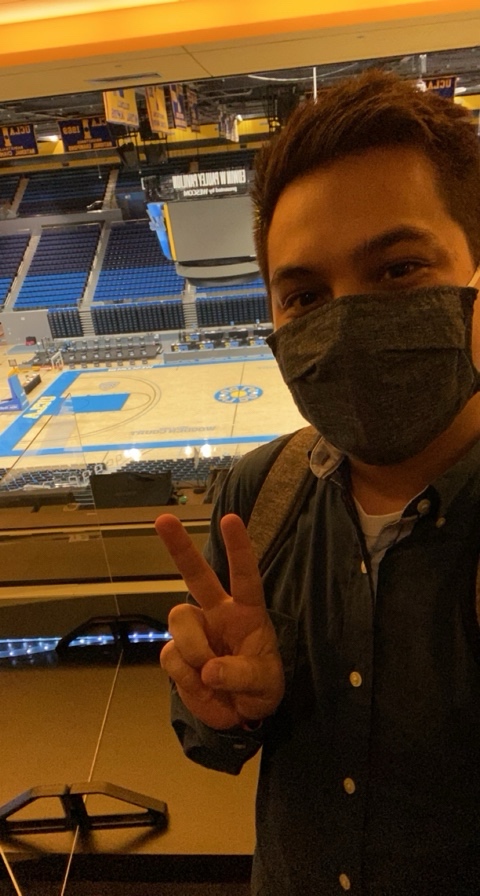
Jordan:
I remember we once had a reporter come into the newsroom and explain their career and everything, and something they said stuck out to me: always be willing to learn, and expand your knowledge. That’s very important in my field because you can get very easily, go through the routine of the same thing repeatedly. But there’s no real way to improve when you’re doing that. Another thing, I was always trying to learn about the English language as much as I could. To learn other types of words that I could be using in stories and expand my vocabulary. The goal is not to get stuck in a box.
Kemdi:
What is the piece of work you’re most proud of during your time at the Daily Titan?
Jordan:
I did a feature on Cal State Fullerton’s basketball coach, Dedrique Taylor, and I had an amazing time, sitting down with him and talking to him about more than just basketball. We talked about beliefs and upbringing, and talked about his kids, and just kind of the human that he was. It was more than just Oh, how’s your team doing? Or like, you know what’s going on with this player and things like that? It was one of my 1st major features that I wrote, and it was amazing. If I read it back now, I’d probably wish I could have done better on certain things, but I think at that time it was very big for me.
Another one that I didn’t necessarily write but led the coverage of was when that faculty member got stabbed on campus back in 2019. That was my first week being editor in chief, so I was essentially being thrown into the fire. I was thinking I’d never done this before. I had to learn how to do this on the fly, and it was nice to have a team that worked together to get all the possible information. We got all the right details and talked to the right people. I think our coverage of that was amazing, and I think we did it to the best of our abilities, and didn’t leave any stone unturned.
Kemdi:
I’ll never forget that day. I had just moved into the freshman dorms.
Jordan:
What’s crazy about it is that it was in the parking lot next to College Park, and that’s also where the Daily Titan newsroom is. I had a meeting and I got told, hey, there’s police over here. I’ll never forget that day. Just how chaotic it was. But yeah, that was like that was a whole experience. It was truly a weird time.
Kemdi:
Moving onto USA Today, I want to know more about what your application process was like for the internship you had and how you were able to parlay this into a job.
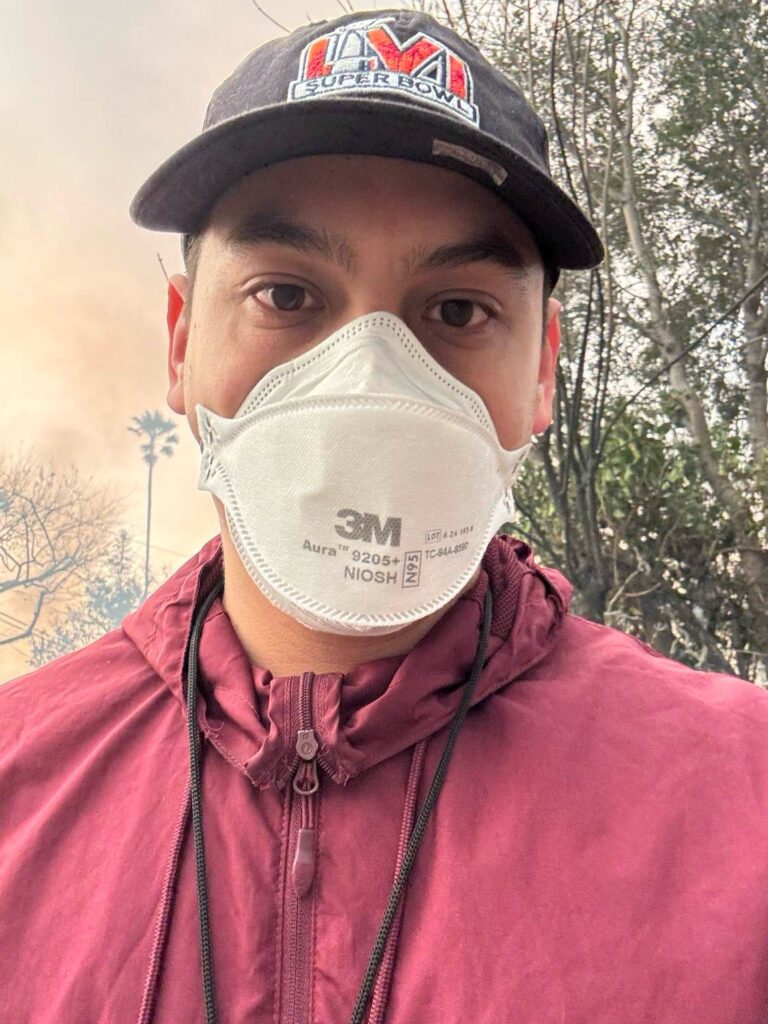
Jordan:
I found out about the U.S.A. today internship through a journalism newsletter that I was subscribed to. I applied to it and then a couple of days later, I heard back about an interview. I went through a round of interviews and thankfully, was one of the 2 interns that they hired that semester. It was a big deal for me, because I went from writing for Cal State Fullerton, the Fullerton community, and the greater Orange County area to a national audience.
My internship technically lasted until about 2 months before I got hired, and I think I just wanted it so bad, I wanted to be so good, you know, right away. I had a great group of editors and reporters who wanted to help me. I learned the ins and outs and how to be good at it. I took every piece of advice I was given. I treated it as if there was a Pulitzer Prize on the line. I loved everything that I was doing. I got to help on the Super Bowl, March Madness, and stuff like that.
I don’t know if it was the dedication that I was showing it, or the willingness to listen to editors, but a new team was being put together, and my name got thrown into the pot. I interviewed with a different editor for the new site, and I was incredibly lucky enough to get an offer to have a full-time job, which at the time, I couldn’t believe. It happened so quickly. I was able to get the job because I was able to prove to people that this is something that I want to do. I’m not gonna half ass it, I’m gonna make the most of my opportunity.
Kemdi:
Can you describe what a usual day is like for you at USA Today? Is it more of a 9-5 thing or similar to your experience at the Daily Titan?
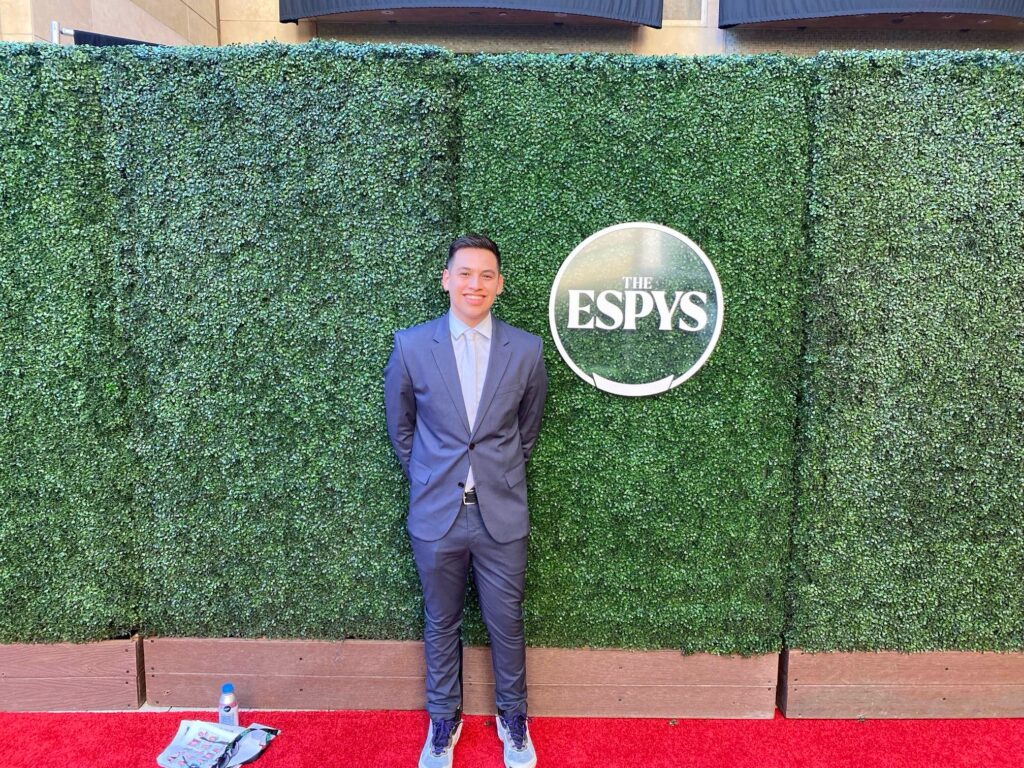
Jordan:
I’ll have a set schedule. For example, on this day I’ll be on from 9 to 5, but sometimes, things happen. A perfect example of that happened last Monday. I was supposed to work 12 to 8, right? I planned on taking a break in between because I planned on covering USC during the NCAA tournament. I’m thinking my night’s gonna go just pretty typical, but then, Juju Watkins gets hurt and changes my entire night. From a playoff game to one of the biggest stories of the night. I remember texting my fiancé that I’d be home around 9 or 10, and I don’t think I got home until midnight. I don’t sign off until all the games are over. There are times where I have a set schedule, and it’s a pretty smooth day, and I can clock in or out and go enjoy the rest of my day, whatever it is. There are also some days when my hours will be all over the place.
Kemdi:
What is the craziest news story you had to cover, and why was it the Luka trade?
Jordan:
I was on when that happened, I think I was doing some of our WWE stuff, actually, and it had just wrapped up. I just remember seeing the tweet, and was like, what? That’s not real, right? Thankfully, our main NBA reporters were around, and they quickly confirmed it themselves. I just remember being around, I didn’t necessarily cover it, but it was an insane moment.
In terms of what I did cover, the car accident with Tiger Woods and covering Caitlin Clark as a whole are up there. For Caitlyn, it was truly a media circus, just seeing how much interest there was and how many people wanted to see her and everything. The crazy thing about this job is that you think you just covered the craziest thing, but then something bigger always comes along.
Kemdi:
In terms of career goals, where do you wanna see yourself, say 5-10 years from now?
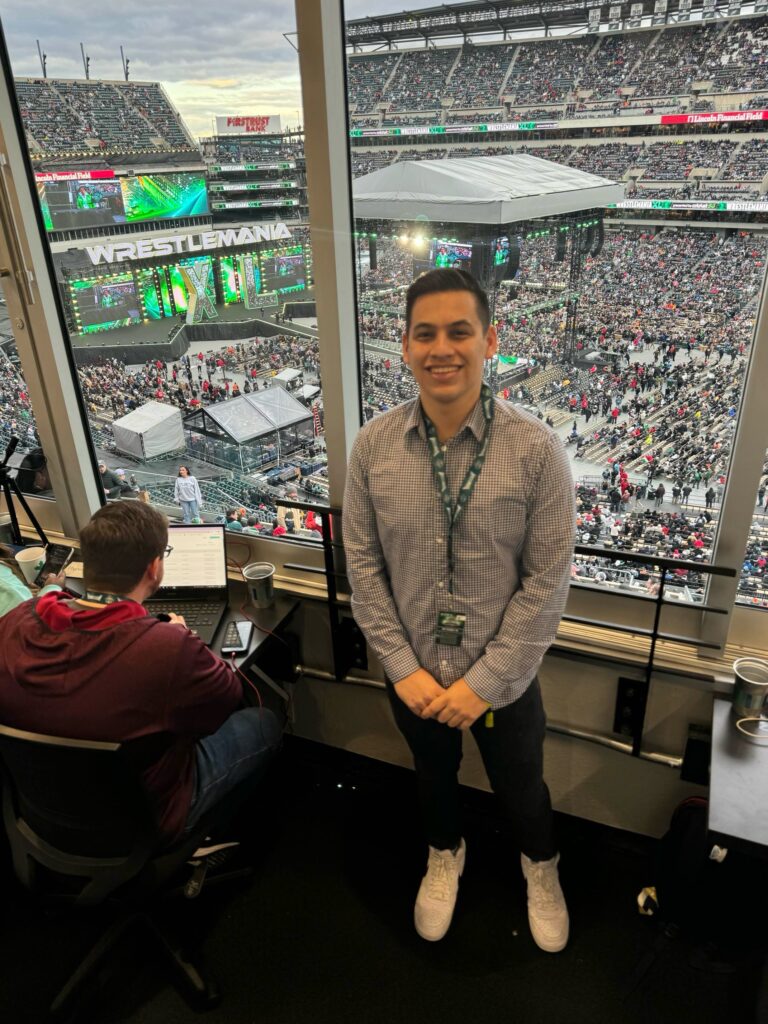
Jordan:
I would want to see myself have more of a consistent beat or thing that I’m covering. Right now, I do trending and breaking news for all sports, and all things in that field. I would love for my main focus to be college sports, though. That’s just one of those things where you just have to get the experience and put the hours in to start building rapport with schools and athletes, and coaches. You have to go to games, go to practices, things like that. It takes time, especially to get to the level of high-profile reporters that you know and see today. But that’s where I’m trying to get to. And hopefully, I’ll be within the next 5, 10, 15 years.
Kemdi:
Last question, do you have any advice for anyone interested in pursuing a similar career path to yours?
Jordan:
Well, I think that the resources are there to succeed at Cal State Fullerton. I think there are a lot of clubs and extracurricular activities that people can do that will put them on the right path. Work on a portfolio and get your name out there. So absolutely take advantage of any opportunities that are on campus. Don’t try to just get a degree.
Ultimately, a class can’t teach you everything, because in the real world, you’ll be thrown into the fire. It’s not going to be easy to do this. I know it’s not easy to do this. It takes a lot. So you know, try to build your career while also going to school. I think the important thing is to just stay focused and make sure that you are doing the things that you want to do later in your career. It’ll take up a lot of your time and it’s gonna suck some days. Hopefully, by the time that you get your degree, you cross that stage and you look back at all that experience, you’ll hopefully be able to look at it and see that it got you to where you wanted to get with your professional career.
Kemdi:
Thank you again for agreeing to do this, Jordan. Is there any way readers can reach you?
Jordan:
Of course, you can invite me to connect on LinkedIn or check me out on Twitter/X @jordan_mendoza5 or Instagram @_jordan_mendoza
